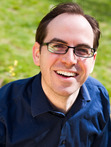Adam Szymkowicz's Blog, page 108
May 4, 2011
I Interview Playwrights Part 348: David West Read
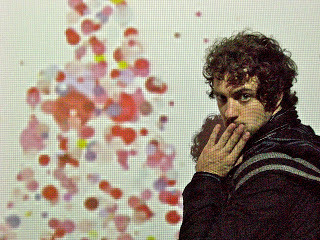
David West Read
Hometown: Markham, Ontario, Canada
Current Town: New York, New York
Q: What are you working on now?
A: I'm working on a commission for the Roundabout about the "golden age" of children's television performers. The play delves into the private life of one such icon, who's trying to make his comeback in the face of Barney and Dora the Explorer while dealing with some personal issues. It marks the first time I've written for puppets.
I'm also developing a commissioned screenplay called THE ROCKETTE, which is inspired by my grandmother, who spent many years performing jazz and tap with an all-seniors' dance troupe. It's kind of like Little Miss Sunshine, except the little girl is 76-years-old.
Q: Tell me, if you will, a story from your childhood that explains who you are as a writer or as a person.
A: For the most part, Canadians watch American TV, but when I was growing up, I was deeply inspired by the Canadian programming for kids (which explains the play I'm writing). I watched shows like Polka Dot Door, Mr. Dressup, Under the Umbrella Tree, Fred Penner's Place and Today's Special. This makes it sounds like I was a TV junkie, but I think I just experienced and remembered TV much more vividly then, whereas now, I tend to forget everything I experience as soon as it's over.
I was extremely shy, and rarely spoke in public, but I used to like to imitate what I'd seen on TV around the house. I think my playwriting is an extension of that; I'm still just imitating things that inspire me.
My ability to regurgitate what I'd learned on television almost got me in trouble when I was about 4-years-old. I was on the elevator at the doctor's office, with my mom, when a black man stepped onto the all-white car. Being a big fan of Sesame Street, I started singing "One of These Things is Not Like the Others." Fortunately, the man had a sense of humor. I don't think I could get away with that now.
Q: If you could change one thing about theater, what would it be?
A: It seemed like a lot of people were vomiting onstage last year. I don't know if that's factual or not, but I seem to remember seeing three plays in a week, all of which featured someone puking. I think we could do with less of that.
Q: Who are or were your theatrical heroes?
A: I wouldn't be writing plays if not for the encouragement of my teachers at Juilliard and NYU – especially Marsha Norman, Christopher Durang, and Daniel Goldfarb. They're my heroes because I know how much I hate reading other people's work, and they do it all the time, with such generosity and care.
Q: What kind of theater excites you?
A: I like big-hearted plays. I like the idea that the playwright might be sitting in the back, crying his or her eyes out, even if the audience is bored to tears. I like to think that it really means something to the person writing it, and that that "something" isn't praise, or recognition, or money. Also, when the turtle started walking in Arcadia, I basically freaked out. I also really liked the chickens in Jerusalem. So, I guess I should add "moving animals" to the list.
Q: What advice do you have for playwrights just starting out?
A: I think it's more important to be a nice and respectful person. More important than being really persistent, or schmoozy, or a great networker. I might just be telling myself this because I'm shy and terrified of mingling, but I think it's true.
Q: Plugs, please:
A: The Dream of the Burning Boy is in its last weeks at the Roundabout Underground, and will close on May 15th. I am incredibly proud of this production, and it's well worth $20 to see Reed Birney's incredible performance.
Published on May 04, 2011 09:24
May 2, 2011
I Interview Playwrights Part 347: Katie May
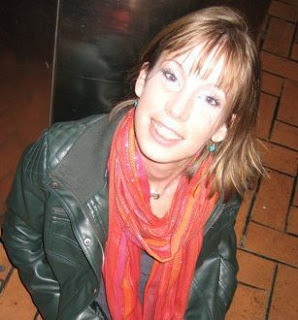
Katie May
Hometown(s): Casper, Wyoming and Boise, Idaho
Current Town: San Francisco, California
Q: Tell me about your commission from SF Playground.
A: This is tough to answer right now. For six months of every season Playground releases a topic to its writers pool of 36 playwrights, everyone has four and a half days to write and submit a ten minute play based on the topic, and once a month Playground gives staged readings to the six "best" plays from that month. At the end of the season there is a Best of Playground Festival featuring productions of six of the strongest plays that were read in the previous six months, as well as staged readings of full length commissions awarded at the end of the previous season. This year they are commissioning three full length plays (to be read in next year's festival) and each commissioned playwright has proposed three plays that he/she would like to write. Because the commissions are read together as part of a festival, the commissioning process is a little like building a season. So, currently Playground is in the process of figuring out which plays will fit together thematically with out too much overlap. I'm in a holding pattern right now, waiting to see which one they want, which has been an interesting experience unto itself. My plays tend to have long gestation periods. I usually have two or three ideas on the back burner and eventually one will bubble to the surface demanding to be written. Right now I'm keeping all three of them boiling. It's making me feel a little schizophrenic with all these characters' voices so consciously on my mind, but I like it. I've never had so many plays so ready to go at the same time before. I'm hoping it will make for a productive year.
Q: What else are you working on?
A: I have a ten minute play, Rapunzel's Etymology of Zero, in the Best of Playground Festival this year. I'm in rehearsals for that right now. It's a math based fairy tale about how Rapunzel is in fact a genius mathematician locked away in her tower. She originates the concept of zero as an actual number—that nothingness is something. It is overtly, unapologetically feminist, but funny too. What's funnier than math and feminism?
Q: Tell me, if you will, a story from your childhood that explains who you are as a writer or as a person.
A: I grew up in a small town in the middle of Wyoming. It's the least populated state in the country. I am strangely proud of that. I spent my childhood hunting horned toads, and going hiking on Sundays because my parents (who both came from different, but fiercely religious backgrounds) shunned church in favor of being outdoors. I still have to explain to people that we didn't ride horses to school (though I can ride a horse), and how hunting funds more conservation efforts than just about anything else (yes I've been hunting). Even though I am a giant liberal, which I in turn defend to my family and to everyone else where I grew up. The weird dichotomy of going into the liberal arts after growing up in the two most conservative states in the country, vs. my pride in having grown up there, vs. the interesting mythology projected upon those places, informs a lot of what I do. I guess that's more of a setting than a story.
Q: If you could change one thing about theater, what would it be?
A: Big west coast regional theater companies would invest in, develop, and champion west coast writers and the western aesthetic. I feel a lot of pressure to go East to get produced in order to be taken seriously out here.
Q: Who are or were your theatrical heroes?
A: Tony Kushner, because I have a background in fiction and he does everything with language that my playwriting professors tried to get me to stop doing. Sarah Ruhl, for her use of stage space, the way her plays move in time, and for giving us a great example what theater can do that film can't. Lee Blessing for being a structural genius and by all accounts a great teacher. Bill Irwin, Suzan Lori Parks, John Patrick Shanley, Marsha Norman, Caryl Churchill. I'm also a big fan of other types of performance outside of theater. I'm hugely inspired by stand-up comedians Bill Hicks and Demetri Martin. Also, the late Tom Proehl who co-founded Signature Theatre Company, among many other giant contributions to theater, but mostly because he was a fantastic human being.
Q: What kind of theater excites you?
A: There's a scene in Jurassic Park (the book) where the dinosaur with the poison spit, spits in a guy's face and then slices him across the belly. He runs away into the jungle with his hand pressed against his stomach trying to keep his organs from falling out. I like plays that eviscerate me like that. The last scene of David Mamet's Oleanna does it, so does Topdog Underdog by Suzan Lori Parks. Those are two plays where you get up, and you stumble out of the theater holding your guts in your hands.
Q: What advice do you have for playwrights just starting out?
A: I'm pretty much the definition of just starting out, so really I have no idea. Find a theater community, put down roots, talk to everyone. I'm more qualified to give advice from the bottom up, which is this: Treat students and the interns like the professionals they will someday become, learn their names, listen to their input. We're talented, we know how to use social media, and we are incredibly loyal to anyone who made us feel valued on the way up.
Q: Plugs, please:
A: Best of Playground Festival runs May 5th to 29th at Thick House in San Francisco. www.playground-sf.org. It's really a fantastic company that is doing more than just about anyone to commission and develop new work, as well as to invest in their playwriting community.
Published on May 02, 2011 13:51
April 30, 2011
I Interview Playwrights Part 346: John Pollono
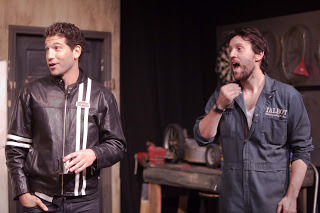
(photo from Small Engine Repair. John is the guy on the right)
John Pollono
Hometown: Londonderry, New Hampshire
Current Town: Los Angeles
Q: Tell me about Small Engine Repair.
A: This is a 70 min one act play about three childhood friends in their thirties who reunite for a night of drinking, fighting and reminiscing. As the story goes on, you realize that there is a much deeper and darker motive for the reunion.
Q: What else are you working on?
A: I'm also working on a play called RULES OF SECONDS which takes place in Boston, MA in 1855. It's about dueling.
Q: Tell me, if you will, a story from your childhood that explains who you are as a writer or as a person.
A: Growing up in New England, I was surrounded by colorful people and natural storytellers. And the sharp and dark New England sense of humor really stuck. So I've always loved telling stories and exploring characters with a lot going on underneath. Another thing about New England is that nobody really talks openly about their feelings or deals with deep secrets. It's all subtext and it can be fascinating and frustrating. Somebody you've known for twenty years never told you he never met his real father or whatever. So being a writer, I've always enjoyed digging in and exploring truths that most people would just keep to themselves.
Q: If you could change one thing about theater, what would it be?
A: Word of mouth would spread quicker and more people would go to it! Especially younger people who may not consider theater to be an exciting option for a night out.
Q: Who are or were your theatrical heroes?
A: Martin McDonagh, Kenneth Lonergan, David Mamet, Tracy Letts, Arthur Miller, Langford Wilson.
Q: What kind of theater excites you?
A: I love theater that is exciting and entertaining and really understands an audience and how to tap into the power of a live performance. I love theater that tells a story and has vivid characters that I get emotionally involved in. And I really appreciate and enjoy great, truthful, witty dialogue that flows and surprises.
Q: What advice do you have for playwrights just starting out?
A: Get your play produced by any means necessary. Instead of writing play after play, get one in front of an audience. Even if it's just a reading. An audience will teach you more about writing than anyone else. Let them help you find your voice as a writer. And also take an acting class so you know how to write for actors.
Q: Plugs, please:
A: Small Engine Repair at Rogue Machine Theatre... I am playing the role of Frank Romanowski... show is currently kicking ass and just extended until June 5. Go to www.roguemachinetheatre.com for tickets and showtimes.
Published on April 30, 2011 07:33
April 26, 2011
I Interview Playwrights Part 345: Mona Mansour
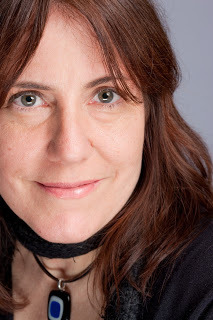
Mona Mansour
Hometown: San Diego, but I try to keep that on the down-low.
Current Town: Manhattan and Brooklyn, mostly.
Q: What are you working on now?
A: I'm about to step into two projects with NYU's graduate acting program. Mark Wing-Davey has been an advocate of mine over there (we met when he directed a reading of my play for the Public's Emerging Writers Group). The first is a piece I'll write for the third-year acting students, using the Joint Stock method. I know very little of their actual process, so it's cool to hear about it from Mark, who created Mad Forest with Caryl Churchill this way. The second project is based on the lives of Russian journalist Anna Politkovskaya and Chechan human rights worker Natalia Estimorova. A small group of actresses have been generating material, and now Jim Calder, who is directing, has brought in me and Carson Kreitzer. The material is fascinating, but the stories, grim. The Middle East, where I've been creatively the last few years, feels like a fucking carnival in comparison.
Q: Tell me, if you will, a story from your childhood that explains who you are as a writer or as a person.
A: I wish I could answer something different here, because this has been played out for me—but I'd have to say the Patricia Hearst saga, as it unfolded. It had everything—a kidnapping, a bank robbery, and most importantly, a very public change of identity: the transformation of a young woman from heiress to kidnap victim to urban guerrilla. The moment the "Tania" audiotapes emerged, with Patty telling her parents they were corporate pigs, my seven-year-old jaw dropped.
Q: If you could change one thing about theater, what would it be?
A: I'd up the pay scale for everyone. A friend, a really fine actor who works a ton in TV, just finished telling me he had to turn down a play—at a prestigious venue in New York!—because he has kids to support, and can't afford to do it for the pre-tax nine-hundred bucks a week. It doesn't make sense to me that the freelance publishing gigs I do pay more than a full-time acting gig.
Q: Who are or were your theatrical heroes?
A: I don't want to overthink this, so in no particular order: Caryl Churchill, Ibsen, Thornton Wilder, Chita Rivera, the founders of Second City and the Groundlings; and many of the teachers I had.
Q: What kind of theater excites you?
A: All kinds. I like to be surprised. Moved. The last thing I went crazy for was Christopher Durang's Why Torture Is Wrong, and the People Who Love Them, which the Public did a couple years ago. He made an exploration of extradition and torture funny! Sick, funny, and totally relevant.
Q: Plugs, please:
A: Noor Theatre is a company of three excellent women—Maha Chehlaoui, Lameece Issaq, and Nancy Vitale. Their mission is to feature writers of Middle East descent. They are doing great work. Support!
Published on April 26, 2011 07:07
April 25, 2011
I Interview Playwrights Part 344: Miranda Huba
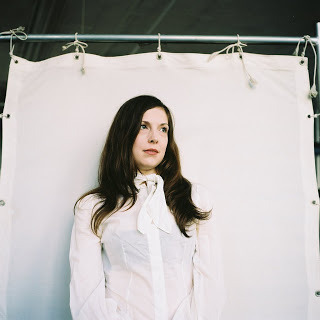
Miranda Huba
Hometown: Ashcroft, British Columbia, Canada
Current Town: New York City
Q: Tell me about Dirty Little Machine.
A: Jane is first introduced to pornography at a young age when she finds a dirty novel in her parent's house. She regards this old paperback as the single most important piece of literature in her life. In DIRTY LITTLE MACHINE, Jane decides to seek out the most degenerate, repulsive, douchebag she can find and date him- in order that she may either fulfill her deep-seated sexual fantasies OR renounce all disempowering desires and become a true feminist. DIRTY LITTLE MACHINE is an investigation of sexual relationships and intimacy in an increasingly voyeuristic culture. DIRTY LITTLE MACHINE is running May. 19th- June. 4th (Thurs-Sat) @ The Red Room, 85 East 4th St. NYC (between 2nd ave & The Bowery) Tickets available @ smarttix.com and more info @ http://www.horsetrade.info/
Q: What else are you working on?
A: I'm working on remounting my one woman show, CANDY TASTES NICE about a girl who decides to auction off her virginity. I'm also writing a play about beauty workers, I use the term writing very loosely as I haven't actually written anything yet its just images in my head at this point.
Q: Tell me, if you will, a story from your childhood that explains who you are as a writer or as a person.
A: When I was about twelve years old my parents took me to London. One warm summer evening we went to see A Midsummer's Nights Dream at the outdoor Theatre in Regents Park. Outside the theatre all these people had blankets out and were enjoying picnics before the show. I remember being impressed with this, that going to the theatre was a really beautiful communal event. The show was wonderful and I remember being in awe of one of the faeries. Her hair was white and styled to look like a punk rocker. She had a huge amount of cleavage and big red circles had painted on her breasts. I don't know, why but I thought it was hilarious. This fairy has a very small part in the show, but I followed her journey completely and the next day bought a little book of Shakespeare monologues and memorized one of her speeches. I still have it memorized. Also near the end of the performance I remember it started raining. Really lightly though, it was absolutely perfect. I knew, after seeing that show, that I wanted to be in the theatre. This experience definitely speaks to the magical quality of my work, the notion that anything can happen. I'm not sure it speaks to the darkness or sexuality but it was an important moment in my journey as an artist.
Q: If you could change one thing about theater, what would it be?
A: Ticket prices. Not that there isn't any reasonably priced and even free theatre out there, but when I ask people why they don't go to the theatre they often cite the cost. Theatre is about community and bringing people together but if only certain people get to participate it looses its impact. Governments should provide more funding to subsidize ticket prices.
Q: Who are or were your theatrical heroes?
A: Off the top of my head: Beckett, Sarah Kane, Caryl Churchill, Richard Foreman, Erik Ehn, Young Jean Lee, Elevator Repair Service, Marie Brassard, Shakespeare, Howard Barker, Mac Wellman, and all my hard working theatre friends.
Q: What kind of theater excites you?
A: Theatre that is necessary. It interests me when people recognize the need to deal with a certain subject matter or tell a particular story.
Q: What advice do you have for playwrights just starting out?
A: Don't worry about writing a 'good play', work on developing your own voice. Once you have found your voice as a writer you can do anything, no one can stop you.
Q: Plugs, please:
A: Please come and see DIRTY LITTLE MACHINE: Running May. 19th- June. 4th (Thurs-Sat) @ The Red Room, 85 East 4th St. NYC (between 2nd ave & The Bowery) Tickets available @ smarttix.com and more info @ http://www.horsetrade.info/
Published on April 25, 2011 08:56
April 24, 2011
UPCOMING
This week: A workshop production of My Base And Scurvy Heart in NYC with Studio 42.
Then I'll be in the OC for a workshop of Hearts Like Fists at Chance May 4.
And the following week, two other readings in LA, with Moving Arts and Urban Theatre Movement.
Right now, enjoy these trailers for MBSH.
http://youtu.be/bBgycWsaZps
http://youtu.be/NLnENTHZ1gI
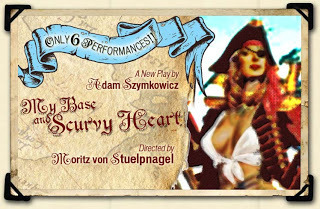

Then I'll be in the OC for a workshop of Hearts Like Fists at Chance May 4.
And the following week, two other readings in LA, with Moving Arts and Urban Theatre Movement.
Right now, enjoy these trailers for MBSH.
http://youtu.be/bBgycWsaZps
http://youtu.be/NLnENTHZ1gI

Published on April 24, 2011 15:20
I Interview Playwrights Part 343: Lydia Stryk
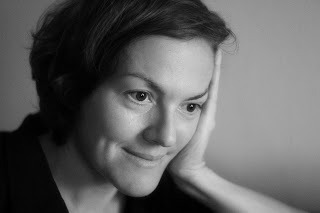
photo by Nancy Barnicle
Lydia Stryk
Hometown:
I was born and raised in DeKalb, Illinois, 60 miles west of Chicago. I left there at seventeen.
Current Town:
Berlin, Germany.
Q: What are you working on now?
A: On a play called Peace. It's about a peace group. I'm telling folks that it's about how the motivations for our politics end up being deeply personal and sometimes violent. But honestly, it's my chance to say something about drone planes.
Q: What is Berlin theater like?
A: I can't answer that so quickly. Let's just say it's a directors' theatre and plays (if plays are the source, at all) are material to be cut up, rearranged, lifted from, riffed on. There are no organizations protecting the sanctity of written work or the playwrights' role in the process. Sometimes the work is really breathtaking to watch. It's subsided by the state. But quite often there is little humanity in it. Lots of bodily fluids flying about and shouting. I didn't come to Berlin for the theatre.
Q: Tell me, if you will, a story from your childhood that explains who you are as a writer or as a person.
A: I lived in my own little theatre as a girl. In my room (I was lucky to have my own room). I created complex and nasty scenarios with my Barbie dolls. And acted out all kinds of scenes in front of the mirror. My little girlfriends and I played a lot of dramatic games like The Newlyweds and the Dating Game, and it's quite possible I was responsible for staging them, though I don't remember. At my instigation, we staged a couple plays in my garage, mainly to make money. So, I guess I can't blame theatres for doing the same.
That probably tells you exactly nothing about who I am as a writer or a person. Because all children live in unreal make-believe worlds. Except that, for me, this kind of behavior has never ended. It is certainly borderline pathological and suggests I never grew up.
Q: If you could change one thing about theater, what would it be?
A: I would wish our American theatre was open –and hungry—to tell stories about the world we live in. What we think of as 'problem theatre', you know. Plays about the massive problems we face as a society, a world, a planet.
Q: Who are or were your theatrical heroes?
A: My heroes tend to be outside the theatre, progressive journalists, for example. (Right now they are Amy Goodman and Laura Flanders.) But I most loved Pinter when I was starting out. His language makes me laugh with delight. His play The Caretaker is perfection for me—deeply humane and funny and asking a huge question--about compassion, how we treat others and why. And Ibsen. He's the greatest social dramatist who ever lived, if you ask me. The one regret I have about giving up acting is not having the chance to play Hedda Gabler.
Today, I think any playwright who tackles the big stuff with honesty is a hero. A few are famous. But there are a lot of them around. You wouldn't know it from looking at what gets puts on, though. They come in all shapes and colors and sizes and an outsized portion are women.
Q: What kind of theater excites you?
A: See above. I am less and less excited by theatricality. Or anything overtly clever. Or personal dramas, unless they reflect on some larger phenomenon. When I look to see what's on, I choose plays where 'big things' are examined—and if they are presented with suspense—and they're funny, to boot, that's great. But the core has to be something serious, ie. someone has to have something they want to say about the state of the culture/society/economy/planet.
Q: What advice do you have for playwrights just starting out?
A: I don't have advice. I have a plea! Think about alternatives to what is out there in terms of reaching and creating audiences. Save the theatre from institutional death!
Q: Plugs?
A:
www.democracynow.org
www.grittv.org
Published on April 24, 2011 12:26
April 22, 2011
I Interview Playwrights Part 342: Rachel Jendrzejewski
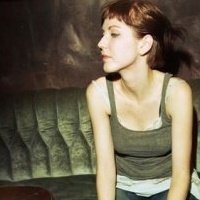
photo credit: Rafal Nowak
Rachel Jendrzejewski
Hometown: Vincennes, Indiana
Current Town: Providence, Rhode Island
Q: Tell me about Theater Masters National MFA Playwrights Festival.
A: Theater Masters is a splendid non-profit organization based in Aspen that (among other things) supports emerging playwrights, especially in the transition from grad school into Next, through this annual festival. It's pretty extraordinary. In January, they flew us out to Aspen to see workshop productions of our short plays and meet all kinds of wonderful generous people; and then we went home and made revisions to our plays, if we wanted; and soon we'll reconvene in NYC for full productions of those pieces, plus meetings with folks in the field, gallivanting, festivity, etc. The whole experience has been quite a gift.
Q: What else are you working on?
A: Most immediately, I'm helping Erik Ehn throw some lunches and dinners centered on art and peace-building, aka the sixth annual Arts in the One World anti-conference (open to all: http://brown.edu/Departments/Theatre_Speech_Dance/grad/aow2011.html)! I'm also revising my most recent full-length play, MERONYMY, for a reading at Playwrights' Horizons in May, directed by the wonderful Kristin Marting. It's a highly visual piece, developed in collaboration with installation artists Megan & Murray McMillan and composer Peter Bussigel -- hence I'm trying to figure out how it might properly function as a 'reading' at all -- but I think it can! And I'm preparing to finish my MFA. Binding documents, ordering regalia, packing up to move.
Q: Tell me about your time in Poland.
A: oh I never know how to answer this question... it was wild and wonderful. I'd always been curious about Poland, both personally (family history) and artistically (Grotowski et al); and then a string of star alignments brought me to Wroclaw from 2008-2009, assisting the illustrious Joanna Klass on worldwide events for The Grotowski Year 2009. I worked long hours at the Grotowski Institute editing English texts, writing grant proposals, coordinating logistics for guests, producing all kinds of events; but I also collaborated on some independent performance projects at Galeria Entropia and Art Cafe Kalambur, as well as took part in some phenomenal workshops. And made some lifelong friends. And wandered. Saw buckets upon buckets of stunning art and performance. Dug into the country's history. Studied the language. People-watched. Had a glorious reunion with long-lost relatives. Did voiceover work and sold valentines to make ends meet. Danced like crazy. Bopped over to neighboring countries. Got lost on trains. Wrote, wrote, wrote.
Q: Tell me, if you will, a story from your childhood that explains who you are as a writer or as a person.
A: When I was little, I was super shy in public but made all kinds of plays, movies, and radio shows at home with my sister, Ingrid. She's six years older than me, so obviously she was always in charge. When I was 6 and she was 12, she decided we should make our own filmed version of A CHRISTMAS CAROL, casting herself as Scrooge and me as everybody else. When it came time to shoot the scene from Scrooge's past in which Belle breaks their engagement, I was so moved by the situation that I started to cry and couldn't stop. I was in kindergarten, but I remember feeling so desperately sorry for both characters that I couldn't do the scene. My mom had to intervene and we almost didn't finish the project - but eventually Ingrid made me laugh so we pushed through. Later in the film, there's a classic shot of me running through our living room with a scarf tied over my eyes, as the Ghost of Christmas Yet to Come, gleefully yelling "woobawoobawoobawoobawooba!" and slamming straight into a chair. So I guess this story reveals that I've forever been very empathetic and very clumsy.
Q: Who are or were your theatrical heroes?
A: Too many to list! but a smattering of highlights (who may or may not identify as theatrical): Maria Abramovic, Robert Ashley, Pina Bausch, Beckett, Brook, John Cage, Laurie Carlos, Anne Carson, Caryl Churchill, Cornerstone Theater Co, E. E. Cummings, Dah, Lisa D'Amour, Derevo, Elevator Repair Service, Erik Ehn, Thalia Field, Grotowski, Uta Hagen, Coleman Hough, Ruth Margraff, Ariane Mnouchkine, Cindy Sherman, Gertrude Stein, Robert Wilson, Teatr Zar, Zeami, Guy Zimmerman... plus of course my family!
Q: What kind of theater excites you?
A: Theater that promotes divergent thinking and compassion through an ongoing becoming of itself -- work that's ever-pushing to get at something ineffable. Intimate immensity. Process as performance and vice versa; theater as gathering and evolution. Work that is startling and weird and hysterically funny. Work that reflects the diversity and surreality of our world.
Q: What advice do you have for playwrights just starting out?
A: Take time to figure out how you like to write and pursue that, without worrying over any seeming Shoulds! Find your people and make things happen, at whatever pace works for you. Be gracious to yourself. Invest in friendships outside of the theatre/arts world. Take walks and explore. Avoid debt. Exercise. Sleep.
Q: Plugs, please:
A: If you can get to Providence this weekend, come enjoy free food and good conversation at Arts in the One World! full schedule and info at http://brown.edu/Departments/Theatre_Speech_Dance/grad/aow2011.html. Otherwise, forthcoming in NYC: BACTERIA at the Theater Masters National MFA Playwrights Festival, dir. Adam Immerwahr, May 3-7, Wild Project (http://www.theatermasters.org) + a reading of MERONYMY, presented by Brown University at Playwrights' Horizons, dir. Kristin Marting, May 13, 3pm.
Published on April 22, 2011 09:15
April 21, 2011
I Interview Playwrights Part 341: Karen Malpede
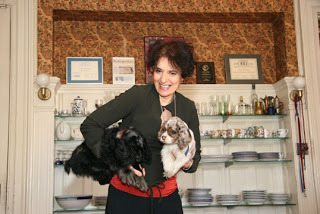
Karen Malpede
Hometown: Evanston, Il.
Current Town: Clinton Hill, Brooklyn, New York. I say it this way because Clinton Hill is the best, best, best of all neighborhoods I've ever lived in.
Q: Tell me about the book Acts of War and your play Prophecy.
A: Prophecy is a play I wrote in response to America's never-ending wars. It's a family drama and a political drama. It's a play that straddles realism and something older, more classical. My plays sit on a nexus between the now and then, looking forward, hopefully, into the what might be. They are hopeful in the same sense that knowledge is hopeful, that feeling is hopeful, that tragedy is hopeful. Now that the play is published in Acts of War: Iraq & Afghanistan in Seven Plays, people can read it for themselves.
I edited Acts of War because all the good plays about the wars were being damned by critics, or being found "too risky" (artistic directors said that to me) to produce. The plays that really look at the cost of these wars on the soldiers that fight them, the Iraqis and Afghans who die in them, the democracy that has yet to pay for them and is being driven so deeply into debt because of them. The book, like my play Prophecy, is an effort to guard against the deadening effect of not knowing and the moral torpor, the intellectual emptiness, the artistic vacuity of not knowing, not thinking, not wanting to experience the truth of what it means to be at war. The book contains seven smart, strong, ethical, exciting, and moving plays. Risky plays. Plays that are beautifully written and carefully constructed. Plays that matter. At least to me.
I wrote the introduction to the book because I wanted to talk about the strategies these playwrights have used when they set about to bring beauty out of the ugliness of our current wars. I wanted to discuss for others the aesthetics of plays that dare to tell the truth about war and its effects on combatants and noncombatants, alike. I link the plays in the book back to Greek tragedy because it happens that theater was created as a way for the Greeks to deal with combat trauma. Theater, war and democracy are intimately connected. The Greek democracy destroyed itself through imperial adventures. This is a cautionary tale. These modern plays address our modern traumas which are as ancient as war.
Q: What else are you working on?
A: My new play Another Life is not nice. It's a surreal look at our complicity in the torture program, the economic collapse, the generally growing meanness of the last ten years since the attacks on the twin towers. It begins on the September 11, 2001. I was in New York and I worked with victims and survivors and I've written about that work. It's a fact that most people in New York did not want to go to war. We were convinced that war was not the answer. We protested against bombing Afghanistan and invading Iraq.
Another Life has heroes. It was terrifying to write. It's based on lots of research, interviews with lawyers who are defending detainees and torture victims and transcripts of interviews with torture victims themselves. I wrote it because I feel we need to know. We need to confront our own complicity, and also honor the best in us: those whistle blowers, like Bradley Manning, those lawyers, those doctors who take a stand against torture, who treat and respect the victims of the rather obscenely named "war on terror."
Like all my plays, implicit in Another Life is the sense that there is another way. We didn't need to plunge into violence and greed just because we were attacked. We might have answered with justice. We might have held trials. We might have believed in democracy. We didn't need to "go shopping" as our then President Bush advised while he was intent upon launching an illegal invasion of a country, Iraq, that had nothing to do with the 9/11 attacks. We didn't need to spend ourselves into recession
So Another Life is a wacky, wild look at how our fear and our sorrow got hi-jacked and turned into revenge, greed, and small-mindedness, from which the nation is suffering now.
Another Life will premiere in Kosovo this June as part of an exchange program between my theater, Theater Three Collaborative, and the National Theater of Kosovo, funded by Theater Communications Group and the Mellon Foundation, as part of their On the Road initiative to encourage international exchange.
Q: If you could change one thing about theater, what would it be?
A: If there was one thing I would change about the theater it would be money. Theater doesn't work well in capitalism; neither do health care, or education, for that matter. Theater is not a business; it is a labor intensive luxurious necessity. It is the one place where we can come together in community and breathe together with living actors while they live through in front of us what we are living through in our hopes, dreams, nightmares and desires. Theater means seeing place. And catharsis means clarity of sight.
So, the theater should be subsidized. It should be the right of citizens of a democracy to have a theater funded from tax money. It costs a million dollars to drop one laser-guided missile on the people of Afghanistan or Libya. A million dollars could fund theater for a year in a town or neighborhood. There was once a Federal Theater in this country from 1935-'39. Everyone should know the history of Federal Theater and read Hallie Flanagan's book Arena.
Commercialism erodes the theater and erodes the audience. We are being made more stupid. We are being made more afraid. We are becoming less.
Q: What kind of theater excites you?
A: If I don't feel more alive at the end of a play than I felt at its beginning, it's a failure. There is nothing quite as thrilling as a beautiful play with wonderfully committed actors. I want to be given life blood in the theater; I want to be startled awake—I mean spiritually awake. I want to feel more than I felt before.
Q: Tell me, if you will, a story from your childhood that explains who you are as a writer or as a person.
A: When I was a child I walked into a pasture full of horses and colts who were grazing and playing in the late afternoon. I totally disrupted their harmony; they became angry, afraid, disconnected. But I knew one of the horses and I climbed onto his back. I sat completely silent and I watched as the trusting community reformed around me. I was no longer an alien. I was one of them. The late afternoon light was golden. The sound of the pasture was pure like a lute. There was nothing to fear. There was nothing do but be. Later, I walked into the farmhouse, and I remember looking at the people gathered for dinner as if they were aliens. They didn't know about where I'd come from. They didn't understand. There was a world of wonder, of harmony, simplicity and grace just outside the door. I suppose all children have an experience like this; that's why so many children's books are about secret worlds, passageways, doors, rabbit holes, hidden gardens. All children who are lucky enough to be able to find a patch of peace. All children lucky enough to be able to spend time in nature. This is why peace and nature, both so imperiled, so wounded, so undervalued and mistreated, are so important. Our imaginations live there. The theater opens the door into worlds we didn't know existed. It lets us in. It takes us in. The theater lets us be with the mystery. When we leave we feel blessed, like initiates into a sacred trust.
Q: Plugs Please:
A: Another Life will be part of a four-play "9/11 Play Series" this September 8,9,10 at the Gerald Lynch Theater at John Jay College in Manhattan. It will run for three weeks in March 2012 at the Irondale Ensemble Theater in my neighborhood Clinton Hill/Fort Greene Brooklyn.
We're raising money for these productions, now. Go to our website www.theaterthreecollaborative.org for information. We are about to launch a funding campaign on United States Artists website.
Join us Monday, April 25, 5:30-7pm at the Drama Book Shop 250 West 40th St., NY, NY as we Celebrate the Publication of Acts of War Iraq & Afghanistan in Seven Plays
edited by Karen Malpede, Michael Messina, Bob Shuman
Foreword by Chris Hedges Introduction by Karen Malpede
Guantanamo by Victoria Brittain & Gillian Slovo
American Tet by Lydia Stryk
The Vertical Hour by David Hare
Prophecy by Karen Malpede
9 Circles by Bill Cain
No Such Cold Thing by Naomi Wallace
A Canopy of Stars by Simon Stephens
A reading from the 7 plays begins promptly at 5:40 With:
George Bartenieff
Kathleen Chalfant
Brendan Donaldson
Najla Said
Loren Sharpe
Wine, snacks & best of all, books
Published on April 21, 2011 07:29
April 20, 2011
I Interview Playwrights Part 340: Darcy Fowler
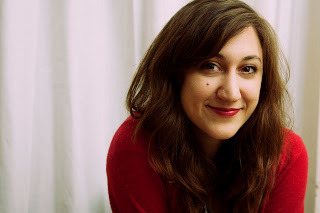
Darcy Fowler
Hometown: Marblehead, Massachusetts.
Current Town: Brooklyn, NY
Q: What are you working on now?
A: I'm working on an as of yet untitled musical with the band The Spring Standards. www.springstandards.com. They're such a wonderful and unique band and I'm excited about the direction we're headed in…it's definitely not your typical musical. We're having our first reading June 29th at South Street Seaport as part of Youngblood's Bloodworks.
I'm also in post production of the 5th episode of a webseries I created and co-write called "You Make My Dreams Come True," about three girls with nothing but a dream and a Hall and Oates Band. Watch it! It'll make you laugh. Will be out next week at: www.youmakemydreamscometrue.com.
Q: Tell me, if you will, a story from your childhood that explains who you are as a writer or as a person.
A: I watched a ton of classic movies, lots of comedies. I remember seeing Woody Allen's "Sleeper" when I was 6 or 7, and my mind being blown. Watched tons of thrillers too, mostly Hithcock. They would scare the crap out of me and I would lay in bed at night for hours, wide awake. I loved it.
Also when I was 10 my mom pushed me to join something in my town called the Rebel Shakespeare Company, which was run by a woman named Keri Cahill, and was basically just a bunch of kids performing Shakespeare on this old fort by the ocean, during the summer. I didn't fully realize it at the time, but it was an extraordinarily powerful program, and it changed my life. I remember playing the Nurse from Romeo and Juliet and running around hitting everyone with a fan. It was the best. Many of the kids from that program are still heavily involved in theatre or the arts in some way.
Q: If you could change one thing about theater, what would it be?
A: I love how London treats theatre. It's so sacred. I wish it was more like that here. I wish more reverence was given to off-off Broadway. I've seen so many gems of plays that have been overlooked in one way or another.
Q: Who are or were your theatrical heroes?
A: Well my list contains more than theatrical ones, hope that's ok. I'm a big Aaron Sorkin fan. His dialogue's like an Olympic ping pong match. Stephen Adly Guirgis. His plays make me feel excited and alive. The Marx Brothers, Tina Fey, Steve Martin, Woody Allen, Mel Brooks. Love all their comedy. Alison Janney. She inspires me as both an actress and a writer. I'd love to write a play for her someday. Also, it's my first year in EST's Youngblood, and it's been really incredible to hear so much new work from so many young, talented and hard working writers. I'm huge fan of everyone there.
Q: What kind of theater excites you?
A: Stuff that makes me feel full and hopeful. Productions with no budget told with just a ton of love and ferocity and care. LAByrinth Theatre. I recently got involved in their Summer Intensive, and it was inspiring and exciting to see how that community worked.
Q: What advice do you have for playwrights just starting out?
A: Well, as a playwright that's also just starting out, there's the instinct to write and then not let your writing see the light of day. Knock on your roommate's door, or call a friend and ask them to read what you've been working on. That's been key for me. If your friends love you, they will help you. As long as you don't ask them too much. Then they'll tell you to simmer your shit.
Q: Plugs, please:
A: Come see the Untitled Spring Standards Project
As part of EST Youngblood's Bloodworks.
Book by Darcy Fowler, Music and Lyrics by the Spring Standards
Algonquin Seaport Theater: http://www.algonquinseaporttheater.org/
South Street Sea Port
June 29th at 7pm
And watch for the 5th episode of my webseries You Make My Dreams Come True At: www.youmakemydreamscometrue.com.
For more info about me as a writer and an actress:
www.darcyfowler.com
Published on April 20, 2011 07:02

